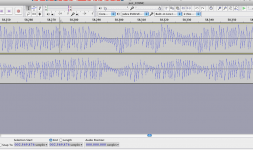RichCini
Veteran Member
This is awesome! Thanks! I'm going to still try to incorporate Manchester decoding into my program so we'll see how that goes.
Rich
Rich
| VCF West | Aug 01 - 02 2025, | CHM, Mountain View, CA |
| VCF Midwest | Sep 13 - 14 2025, | Schaumburg, IL |
| VCF Montreal | Jan 24 - 25, 2026, | RMC Saint Jean, Montreal, Canada |
| VCF SoCal | Feb 14 - 15, 2026, | Hotel Fera, Orange CA |
| VCF Southwest | June, 2025 | University of Texas at Dallas |
| VCF Southeast | June, 2025 | Atlanta, GA |
This was my clean signal in the exact same spot after the leading sequence:
View attachment 67416

See this example of the TRS-80 game Cosmic Fighter converted by a person or persons unknown 40 years ago to run on the Exidy Sorcerer.Being able to automatically identify and selectively reprocess segments of audio such as this could be very helpful.
View attachment 67421
I made a Kansas City Standard decoder which uses a quite advance DSP technique, it might be worth trying. So if you have any KCS files that you don't have already decoded please let me know.
I wrote an article about my utility on the magazine Retromagazine n.17, it's in italian language but the article might be translated in the future as they now publish also "Retromagazine World".
On a side note: where I can find more info about the Exidy Sorcerer, is there a website with files, emulators etc.. ?
Recovering the wave by calculating the first derivative could be a very powerful technique for recovery of computer software recorded on cassette in general.
I think that is right, although the apparent benefit of the derivative is really the effect of high pass filtering.
